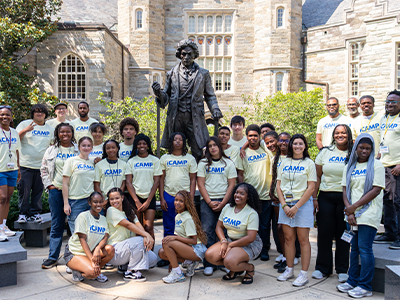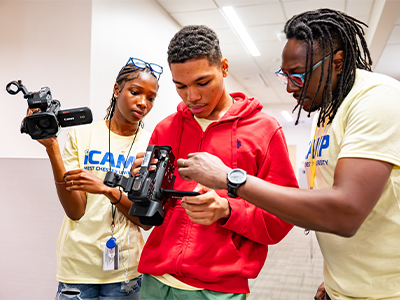WCU’s iCamp 2025: Uplifting Student Voices Through Media, Mentorship, and Social Justice
Now in its eighth season, West Chester University’s iCamp continues to serve as a
powerful launchpad for high school students from Philadelphia, helping them explore digital
media, self-expression, and social justice, all while living and learning on a college
campus.
launchpad for high school students from Philadelphia, helping them explore digital
media, self-expression, and social justice, all while living and learning on a college
campus.
From July 20 - 26, iCamp 2025 welcomed a new cohort of rising juniors and seniors to campus for a free, weeklong immersive experience in podcasting, game development, video production, and digital journalism. The program forged full steam ahead with community support, expert faculty, and the power of youth creativity behind it, despite a reduction in funding from the National Endowment for the Humanities (NEH) this year.
 A Camp with Purpose
A Camp with Purpose
At its core, iCamp isn’t just about teaching students how to use a camera or edit a podcast—it’s about helping young people tell their stories, grapple with the issues that impact their lives, and imagine new futures through media creation. Every student selects a Philly-based social issue to explore through their final project, resulting in powerful, student-led investigations into mental health, gentrification, racial bias, and more.
“We’re not just teaching media skills,” says Dr. Laquana Cooke, iCamp’s Founding Program Director and WCU English faculty member. “We’re giving students a chance to reflect, create, and speak out on the things that matter to them.”
The application process itself invites critical thinking. Students are asked what issues in their community inspire them to take action, and many are exploring topics they’ve never before had the chance to discuss in school. This year’s projects include an interactive game addressing the drug crisis in Kensington, a photo essay capturing the cultural beauty of Philadelphia, and a podcast on systemic inequities in urban education.
Powered by Professionals and Peers
One of the things that makes iCamp unique is its faculty and student leadership model. Instruction is provided by working professionals and WCU faculty experts, as well as by WCU students or past students who act as student leaders. This year’s faculty included:
- Niger Miles, a New York-based filmmaker teaching video production
- Dr. Jeremy McCool, WCU professor and podcasting specialist
- Dr. Randall Cream, a Digital Humanities professor teaching gaming
- Earl Hopkins, a journalist from The Philadelphia Inquirer who taught digital reporting
Each teaching artist is paired with a WCU student leadership staffer. These near-peer mentors support campers in everything from brainstorming their storyboards to navigating college life.
“I’m amazed every year at how quickly these students catch on,” says McCool. “They’re natural visual storytellers. In just a week’s time, they become media-savvy creators with real messages to share.”
Student Voices and Future Pathways
iCamp’s leadership team intentionally builds connections with and cultivates a curriculum rooted in community, reflection, and creative problem-solving.
For 17-year-old Azaria Redding, a rising senior at Creative and Performing Arts High School and a competitive dancer, iCamp became more than a summer activity—it’s been a revelation. “I love to write, but I never saw myself as a journalist before,” she says. “Now I do. iCamp made that feel real for me.”
Redding is one of a few returning students who now view WCU as a top college choice. “I love living on campus. It’s beautiful. And the conversations we have during Social Justice Hour make me think in ways I never have before.”
A Homegrown Pipeline of Talent
One of iCamp’s biggest success stories is its role as a mentorship and retention engine, not only for high school students but for WCU students as well. Many camp leaders started out as participants or student staffers and have continued to grow with the program.
Gabriella Melchiorre, now the Assistant Director of iCamp, began her journey as a WCU undergrad and has never missed a summer since. She now teaches fourth grade in North Philadelphia and says, “Every year, the students are different. They bring new energy and new perspectives. It gives you hope for the future.”
Moving Forward
iCamp remains free to participants thanks to ongoing sponsorship from Truist Bank, First Resource Bank, and internal WCU support. The value of the program, estimated at $1,600 per student, is fully covered. iCamp is seeking new sponsors.
Dean of WCU's College of Arts and Humanities Dr. Jen Bacon reaffirms the University’s commitment: “iCamp is one of the most meaningful programs we offer. It brings Philadelphia students to our campus, introduces them to college life, and helps them shape their voice through the arts and humanities. We’re building bridges between generations, neighborhoods, and institutions.”
For more information, visit iCamp or follow @icamp.wcupa on Instagram.
